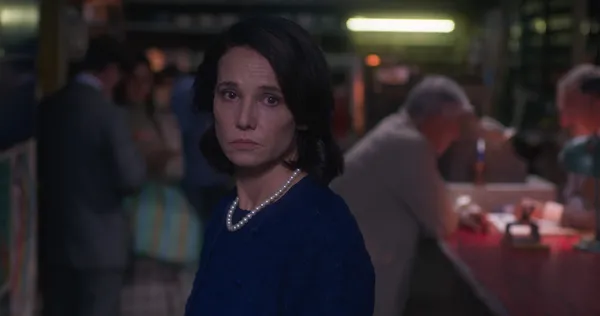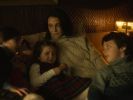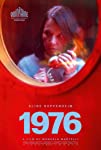Eye For Film >> Movies >> 1976 (2022) Film Review
1976
Reviewed by: Amber Wilkinson

The South American dictatorships of the Seventies continue to provide fertile ground for the makers of tense psychological thrillers, with actress-turned-director Manuela Martelli’s impressive female-centric film following in the footsteps of the likes of Andres Wood (in whose Machuca she features) Pablo Larraín (Post Mortem, No, his list goes on), Benjamín Naishtat (Rojo) and Federico Veiroj (The Moneychanger).
Her focus is Carmen (Aline Küppenheim), the well-heeled wife of a doctor, who used to be a nurse and who is heading with a pot of newly mixed paint to redecorate the family’s beach house, ready for a gathering of her grown up children and grandkids. Martelli flashes her style from the start, a couple of pink paint drops on a shoe almost idly reminiscent of blood, as somewhere outside the shop, someone is being plucked off the street and “disappeared” by Augusto Pinochet’s regime.

As Martelli immerses us in the atmosphere of Chile of the period, via squelchy radio and shows watched on a TV that comes to the beach house swaddled like a baby, an anxious, electro-spiked score from Mariá Portugal heralds the dangers to come. Carmen’s is a comfortable life and one that she sails through in style, her precisely chosen camel coat just part of a wardrobe that makes a statement about her societal position without being ostentatious, a wardrobe that she herself will symbolically turn on.
Küppenheim gives Carmen the air of a woman who is both aware of this privilege and yet, on some level, also uneasy with it, readings given at a nearby church to a group of blind people suggesting that she is looking for more to fill her days than paint choices. Perhaps that’s why, when the priest (Hugo Medina, whose eyebrows put Martin Scorsese’s in the shade) asks if she will care for a young man, Elías (Nicolás Sepúlveda), who has taken a bullet to the leg, she doesn’t prove particularly inquisitive about how it happened. Soon, she is trying to get hold of antibiotics and, increasingly twitchy, as she tries to help Elías to safety.
Elegant framing is found throughout, whether there is focus on a face or a detail or simply a car door intruding into the frame, while the colours of red and blue are set against the more familiar jaundiced browns of the period lending a unifying feel to the look. Martelli carefully crafts an air of almost casual dread. The sea by the beach house looks not like a welcoming holiday spot but something more impassive but potentially dangerous when caught on Soledad Rodríguez’s camera. As Carmen finds herself on elaborate “missions” we can sense the frisson but also the fear, a paranoia that, Carmen knows all too well, may not be paranoia at all. Women’s place in society helps and hinders. On the one hand, she sticks out in a bar, maybe a little too close to curfew – is the regular just being overfamiliar or is there something more behind his questioning – while on the other, she appears to sail under the radar, because after all, what sort of serious threat could a woman pose?
These ambiguities are strategically employed by Martelli and her co-write Alejandra Moffat, keeping us guessing as to Carmen’s full motivations, possibly because she couldn’t full articulate what they are herself. Meanwhile, thanks to her Martelli’s strong control of mood that brings tension to the boil so gently we almost don’t notice it till we’re cooking, we don’t need to see the regime in full view to know its presence drips everywhere anyway, just like that paint.
Reviewed on: 07 Jun 2022

















